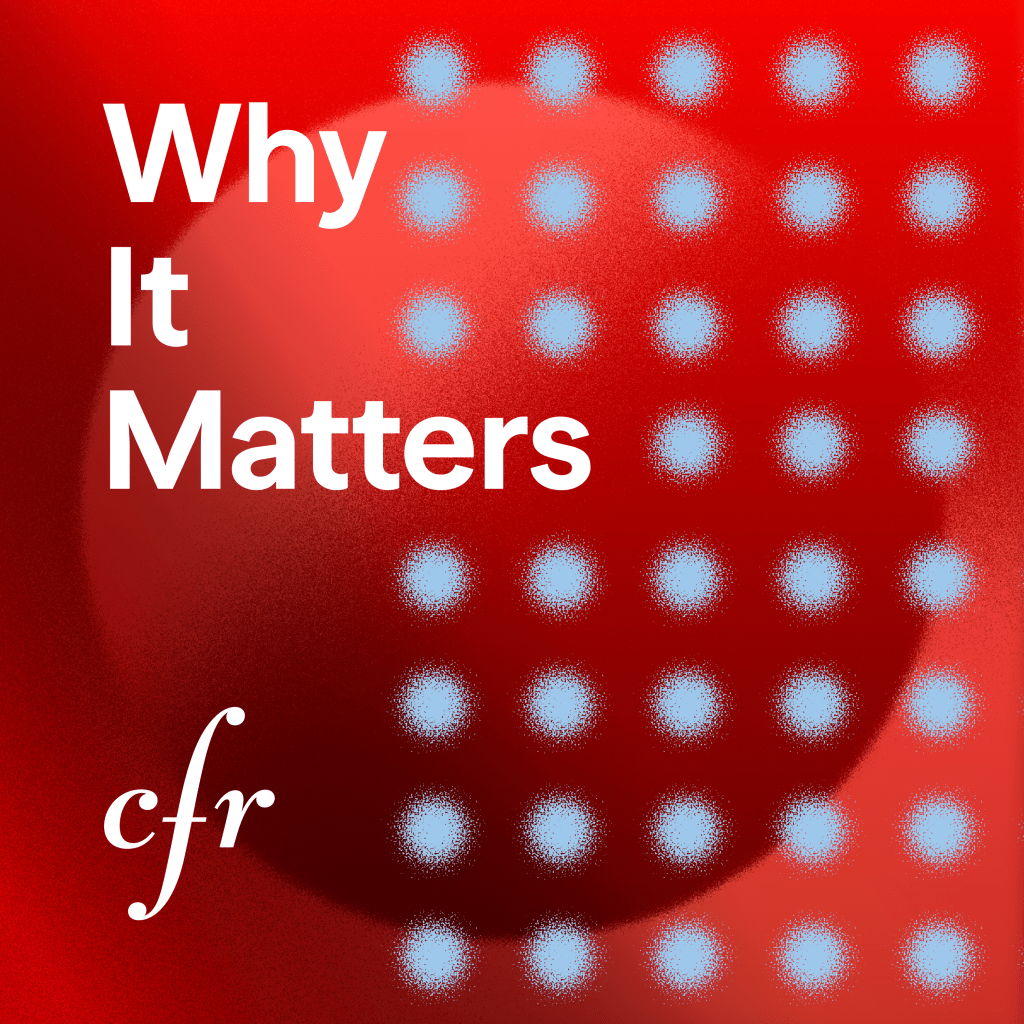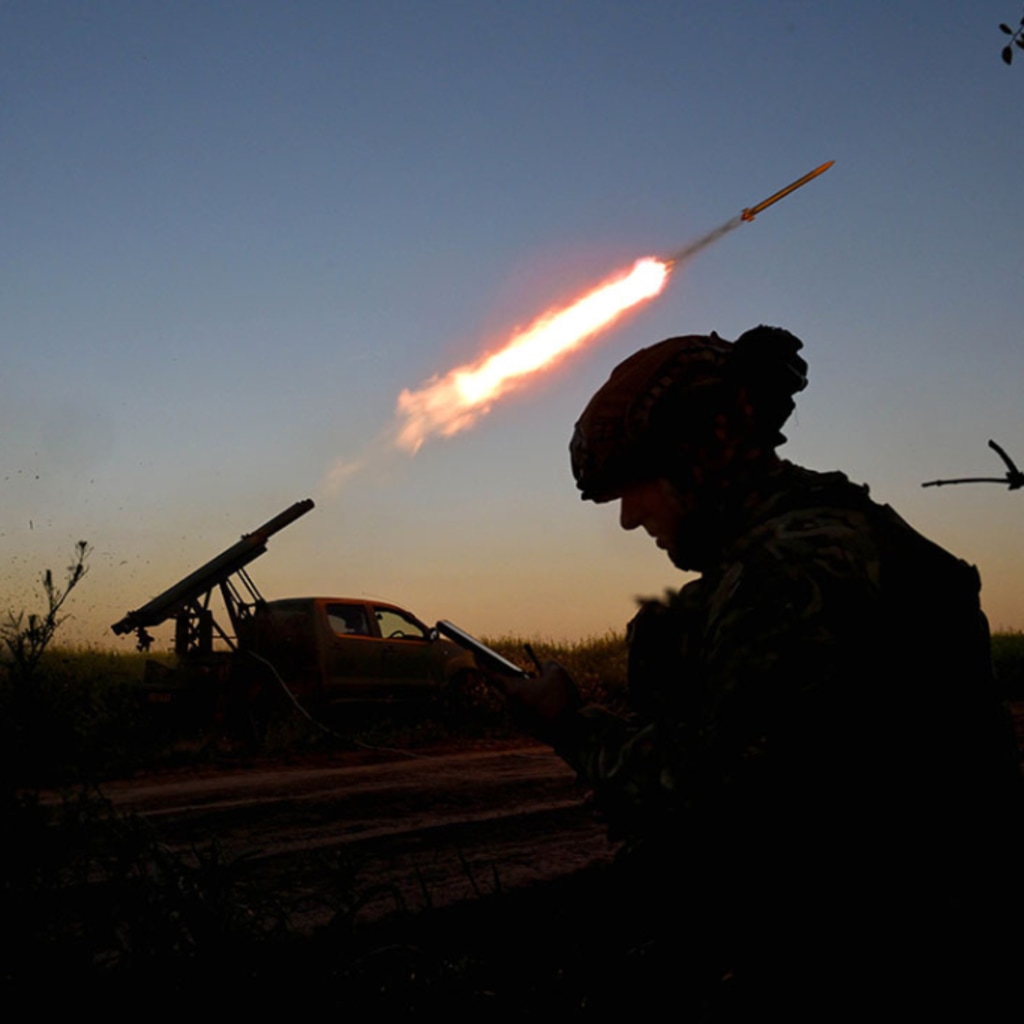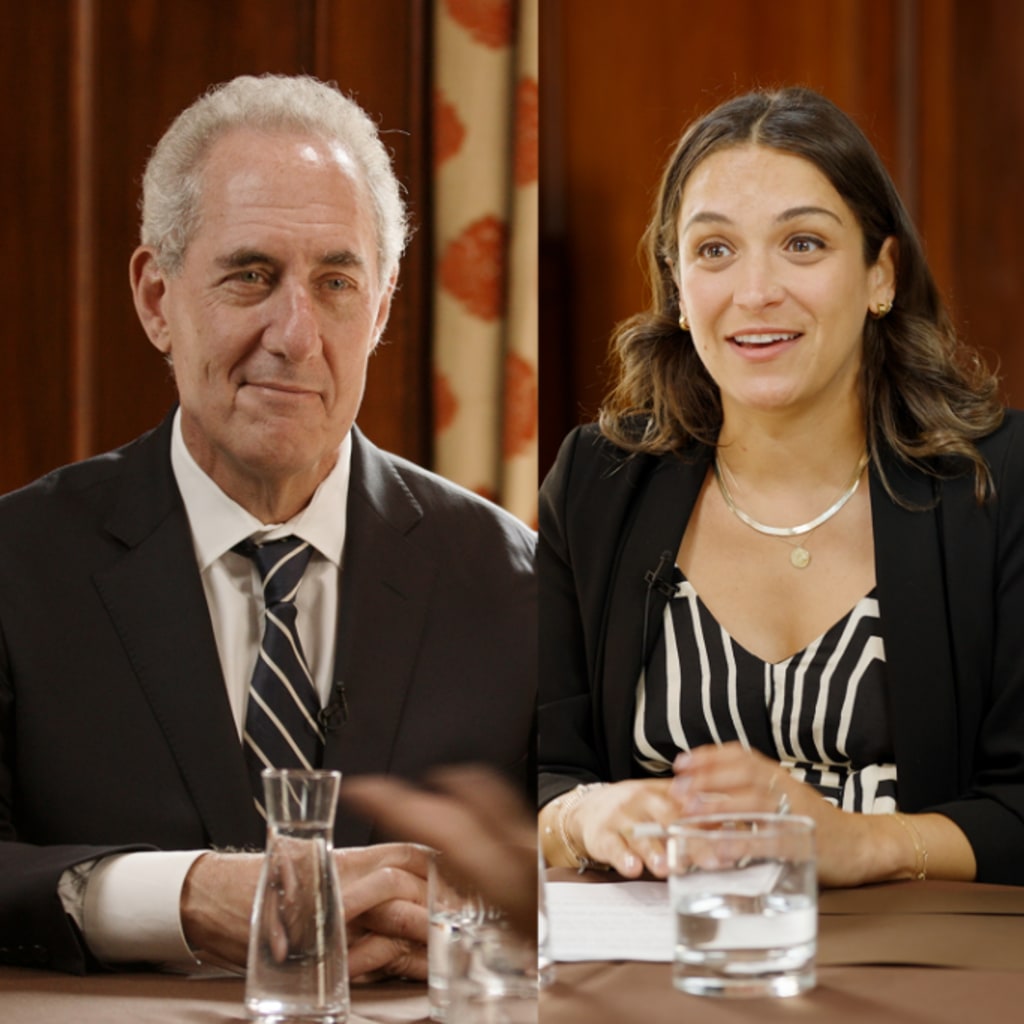The Big Red Button
A U.S. president can launch a first-strike nuclear attack at any time and, according to the law, does not need to seek advice first. Some experts think that’s too much power to put in one person’s hands.
Published
Host
- Gabrielle SierraDirector, Podcasting
Guest
- Richard K. BettsAdjunct Senior Fellow for National Security Studies
Supervising Producer
- Asher RossLead Content Strategist
Audio Producer and Sound Designer
- Markus ZakariaAudio Producer & Sound Designer
Associate Podcast Producer
- Rafaela Siewert
Senior Producer
- Jeremy SherlickDirector of Video
Show Notes
In the United States, the president has sole and unconstrained power to launch a first-strike nuclear attack. While the system is built to provide the president with as much expert advice as possible, consultation is not legally required, and some experts say that such an order could be executed in a matter of minutes.
Today, we unpack the president’s sole authority to launch, and its implications for national and global security. Is it wise to invest so much power in the hands of one person? What are the alternatives? Gabrielle Sierra explores a system that has been overlooked for years, as she sits down with three nuclear security experts.
From CFR
Nuclear Weapons, CFR
“What the INF Treaty’s Collapse Means for Nuclear Proliferation,” Lori Esposito Murray
“The Lingering Specter of Nuclear War,” Stewart M. Patrick
Read More
“What is US nuclear policy, exactly?,” Abigail Stowe-Thurston
“Explosion Shines New Light on ‘Secret Nuclear Cities’,” Alexandra Bell
“The President and the Bomb,” Richard Betts
“What Should the World Do With Its Nuclear Weapons?,” Joseph Cirincione, Atlantic
“An Unsung Hero of the Nuclear Age,” Ron Rosenbaum, Slate
“Our Apocalypses, Ourselves,” Emma Claire Foley, Inkstick
“American students aren’t taught nuclear weapons policy in school. Here’s how to fix that problem.,” Erin Connolly and Kate Hewitt, The Bulletin of the Atomic Scientists
Weapons of Mass Destruction Proliferation, Center for Strategic & International Studies
Watch and Listen
“What If We Nuke a City,” Kurzgesagt
Transcript
MONTAGE FROM “MADAM SECRETARY”: Mr. President I have threat conf...Yes sir...Mr. President I strongly advise major attack option one...I concur...Anything less than the most devastating counter strike invites a second wave...Mr. President we’re running out of time...There has to be a better option than just responding in kind to an all-out attack it would almost certainly bring about a nuclear winner...There’s only one way to fulfill your constitutional obligation Mr. President...Does anyone disagree with that assessment?
We’ve seen this go down in movies dozens of times. A president in a room with generals and serious looking advisors, discussing whether or not to launch a nuclear weapon. For most of us, this is how we think it works in real life.
But, it turns out, there is no law that says the president must run his decision by an advisor. That meeting with experts in the situation room? Doesn’t have to happen. The U.S. president has sole authority to launch a nuclear weapon, and he can technically do so at any time.
I’m Gabrielle Sierra, and this is Why It Matters. Today, a look inside the rules for nuclear launch in the United States, and the risks of giving one person so much power.
Alex BELL: Hey I’m Alex Bell.
Abigail STOWE-THURSTON: And my name is Abigail Stowe-Thurston.
Bell and Stowe-Thurston are both experts at the Center for Arms Control and Nonproliferation, an NGO that focuses on nuclear security. This means they spend every day thinking about how to prevent nuclear war.
Gabrielle SIERRA: OK, so the only person that is in charge of launching a nuclear attack is the president?
There’s no stopgap, there’s no other people he has to consult. There’s nothing else, just his decision?
STOWE-THURSTON: Yeah. So there’s no requirement that the president consult with anyone. They can, and our command and control system is designed so that he can get in contact with advisors that he wants to speak to. But, again, there’s no requirement that he consult with anyone.
Before we go any further, let’s get our terms straight. There are two kinds of nuclear strikes, retaliation and first use. The details are complex, but both are essentially what they sound like. Retaliation involves responding to a nuclear attack with a nuclear attack. First use means being the first to use nuclear weapons in a conflict. Neither of these scenarios requires the president to consult with experts.
So if the scene with the big board and the president talking to all his advisors doesn’t need to happen, what actually does need to happen? The protocol for launching a nuclear weapon is highly secretive, but the main components are known.
SIERRA: Could you walk me through how a first-use nuclear strike would go down?
BELL: It basically starts with the president deciding that he wants to use a nuclear weapon. He can decide this because he feels like an attack is imminent on the United States. He can decide it because we’re in a conflict and he wants to use a nuclear weapon to end the conflict, you know, basically escalate so far that the other side will back down. Or he can just decide he wants to use a nuclear weapon. There are issues surrounding whether or not it would be a legal order, but I think in the heat of the moment you’re not going to have a bunch of lawyers running into the room saying I don’t think this is legal. He actually has a direct line to the National Military Command Center.
This facility, run by the Pentagon, is ready at any minute of the day to receive a launch order. Remember, the president is the commander in chief of the military. All he has to do is pick up the phone, indicate the target, and the number of weapons he would like to launch.
BELL: He has something called a biscuit, which is a little card that has launch codes on them. Someone verifies that it is, in fact, the president giving this order. The order goes out. And within five minutes from the president deciding, I want to launch a nuke, to a nuke in the air, that’s how easy it is.
SIERRA: It’s a terrifyingly short amount of time, and terrifyingly easy to do.
BELL: Yep, and you’re relying on the person who has this authority to know and have thought through all of those consequences and we take it for granted that that person will have thought about that before they do it. There’s no check or balance to make sure that the president’s in the right headspace, has thought through everything, has talked with our allies. None of that’s there.
SIERRA: And has it always been this way?
BELL: So historically commanders did have the ability in the Eisenhower administration, just the beginning of the nuclear age, to use nuclear weapons on their own authority, should they not be able to get in contact with the president. And then it was in the Kennedy administration that we really solidified the idea that it should be the president and the president alone, that the consequences of nuclear use is so massive that it really should be a decision at the top level. The idea being that the American public would always elect a rational and straight-thinking president. And so that’s why this sort of very undemocratic process developed, so it’s a bit of a nuclear monarchy.
SIERRA: So the idea was that this one person, who was elected by all these people, would have the wherewithal to make the right decision in this situation?
BELL: Yeah, it was theorized that way. But not everybody always agreed with it. In fact, during the height of the Cold War there was a lot of debate about whether or not this was a good structure. And it kind of went to macabre places at times, where somebody was positing that actually you should have the launch codes in a sort of pill inserted inside of the heart of a military attaché, and the president would actually have to kill that military attaché to get the codes and be able to kill hundreds of thousands of people. Obviously, that was not an actionable plan. But theorists at the time were sort of making the case about how much you’re putting on the shoulders of one person, and whether or not that’s a good idea when it comes to weapon that’s capable of flattening cities, and beyond.
The stakes surrounding the decision to launch a nuclear first strike are as high as they get. And since the attacks on Hiroshima and Nagasaki, no president has done so.
In an ideal world, the president would think long and hard, and hear a wide range of opinions, before undertaking a first strike.
But when it comes to the other nuclear scenario, retaliation, the president would not usually have the luxury of time.
Richard BETTS: For retaliation, you have to be able to decide and execute the retaliation in a very short time, lest you risk being wiped out and neutralized before you can do so.
This is Richard Betts. He’s the director of the Saltzman Institute of War and Peace Studies at Columbia University, and an adjunct senior fellow here at the Council. He’s served on the Senate Select Committee on Intelligence, the National Security Council, and advised three CIA directors.
SIERRA: How short is that time?
BETTS: Well, that depends on where you are. Between India and Pakistan, which are right next to each other, it could be almost instantaneous. For the United States and Russia the time was generally thought to be once the missile age began, about twenty to twenty-five minutes, at least for the United States, depending on various technical details.
SIERRA: So, help me understand, what is it that you’re trying to achieve by striking back?
BETTS: The answer is not hard and fast because, obviously, we have no experience with this question. There’s no real data to go on. We never tested the system. But the basic rationale is that by having the capability and threatening to exercise it, the capability to retaliate, that constitutes deterrence. It will make the other side decide not to do it in the first place, lest they suffer the consequences.
In other words, convincing the other side not to attack you for fear that your counterattack will wipe them out, that it will be mutual suicide, in effect.
But there are some who see a silver lining in the cloud too, and that is because nuclear weapons make the prospect of war between two sides that both have them so apocalyptic and unthinkable, it makes them more cautious. And it’s nice to recall that we had a Cold War of forty-plus years with great tension between the superpowers, but no World War III. And some believe that that was because of nuclear weapons and that if nuclear weapons hadn’t existed, you probably would have gotten a World War III sometime after 1945. And there’s probably some truth in that. So in a way there’s a paradox or a dilemma here. Do we want to increase the chances of peace by making war unthinkable because it would be so suicidal, or do we lack confidence that we can control all the loose ends, and would it be better if the capabilities didn’t exist?
The nuclear world we live in today was built in the Cold War. And for those of us too young to remember, it’s easy to feel disconnected and removed. But the nuclear rules of the Cold War, with its focus on deterrence, are still in place.
A good way to understand this is to take a look at the Cuban Missile Crisis.
CRONKITE: 00:19 “The crisis now has reached a head. All week reconnaissance planes have been sweeping the island of Cuba, the new intelligence photos are in and now the evidence is unmistakable, it shows Russian IL-28 Beagle Bombers capable of carrying nuclear weapons.”
OK. Cuban Missile Crisis in 30 seconds.
In 1962, Soviet leader Nikita Khrushchev and Fidel Castro secretly agreed to bring nuclear weapons to Cuba. That meant the USSR had nuclear weapons just 100 miles or so off the U.S. coast. Goodbye deterrence!
All hell broke loose after an American spy plane detected the launch facilities. The Navy blockaded Cuba to keep more missiles from being delivered. The blockade came face to face with soviet ships. Messages were flying back and forth between Washington and Moscow. President Kennedy was under enormous pressure to act quickly. For 13 days, the world watched in horror, knowing that one wrong move could lead to nuclear war.
CRONKITE: 7:05 “no one is certain how many of them are headed for cuba with cargos of prohibited weapons, all that is sure is that within 24 hours a confrontation between the searching forces of the United States and a soviet vessel headed for cuba must take place.”
BETTS: It was the closest that the United States and Soviet Union ever came to war, and nuclear war.
It happened not because either side wanted it to happen, but because their incentives to put pressure on each other led them to take actions which built up to a situation where it was hard for them to get out of the confrontation. There were some points at the height of the crisis where it looked very likely that war was imminent. And what would have happened in that case you can only leave to your imagination, but we also found years later that certain accidental things had happened that got us closer to nuclear war than we had realized at the time.
BELL: It really brought into stark relief that having a president who has to think about everything, not just the conflict that’s going on but the consequences after the fact. And there were people during the Cuban Missile Crisis that were advising the president to use nuclear weapons, and should it have come to that. And it was really the president alone, and I think his closest advisors, that sort of assessed the situation, and pulled back, and kind of created this idea that the president would always have the sense to step back from a conflict, and I think that’s while something we hope for in our presidents, it’s not something that is guaranteed.
The crisis shows how close the world has come to nuclear war, and that even with cool heads, intelligent advisors, and a president who listens to them, luck has played a terrifyingly important role in our survival so far.
DUCK AND COVER: 00:35 “He knew just what to do, duck and cover. First you had to know what happens when an atomic bomb explodes.”
SIERRA: I personally grew up not thinking about these things. You know, we had shelter drills in middle school and it felt very old-school and like something out of a different era, a nuclear era. I mean, does it feel to you that that era is back?
BETTS: Yes, for several reasons. One is we had a holiday from worrying seriously about these questions after the Cold War, peace between the United States and the Soviet Union, the crackup of the Soviet Union, the weakening of Russia, and good relations with China until fairly recent years meant that most people, outside a few specialists, figured this was not a problem anymore.
But they forgot that, first, the weapons still exist. The United States and the Soviet Union got rid of a lot of their nuclear weapons, but they had so many that even having gotten rid of a huge proportion of them, they still have thousands. And the holiday from conflict, among great powers is over. Tension between the United States and Russia and the United States and China is growing, and it’s a reminder that more serious conflict could be on the horizon.
Clearly the Nuclear picture is complex. Presidential launch authority is only part of it. There are serious threats emerging from North Korea and Iran, and Pakistan and India have nuclear tensions all their own. After years of progress on arms reduction, some nuclear agreements between the U.S. and Russia are falling by the wayside. There is a lot more to cover than what we can get into today, so we’re going to add some resources to the show notes for this episode. Go check them out.
But still, with all these growing tensions, I found myself asking the same questions again and again.
Why put such a grave decision in one person’s hands?
Can this really be the best system?
And why hasn’t this been a major topic of debate for years?
SIERRA: Why hasn’t it come up before?
BETTS: Well, that’s a good question. I think for a long time not many people knew much about the system except insiders who were also constrained from talking about it freely. And most of the concern among people who think a lot about nuclear weapons and nuclear strategy, much of the concern has been focused on dealing with the problem of ensuring capability to retaliate.
But as to why there hasn’t been as much notice of the question of the president’s unilateral authority, it may be because with all the other problems that have filled the plates of analysts, we hadn’t yet had a president that jerked people’s chain as much as the present one.
SIERRA: So in a way it’s sort of a good thing that it’s coming up?
BETTS: Well, I think so. It’s better to confront this question than not. I think another reason not much attention has focused on it is that most people assumed there really wasn’t anything practical that could be done.
SIERRA: In what way?
BETTS: Well, the political system is paralyzed, very polarized. It’s hard to get anything done, to get agreement by a large enough coalition to change traditional arrangements. And because it would be such an uphill battle, a lot of people figure it would be tilting at windmills.
But in 2017, legislators did try to do something about it. Congressman Ted Lieu and Senator Ed Markey introduced legislation that would prevent the president from launching a nuclear first strike without Congressional approval. The legislation still hasn’t gone anywhere, but it did result in a Senate hearing. The first one in over 40 years where lawmakers openly discussed the problem.
U.S. Senate Committee on Foreign Relations:
CORKER: 00:31:00 “The hearing itself will actually come to order...today it’s my hope that we will remain focused on the topic at hand, the authority and the process for the use of nuclear weapons.”
CARDIN: 00:38:00 “We need to revisit the question on whether a single individual should have the sole and unchecked authority to launch a nuclear attack under all circumstances.”
RUBIO: 1:32:00 “I think it could have repercussions that are significant including encouraging some of them to perhaps pursue their own deterrent capability if they come to doubt our political ability and our willingness to live up to our commitments...actually making the world more dangerous, not less dangerous.”
UDALL: 1:17:00 “Would it not make sense to require at least one other person to sign off on a decision to launch a first strike.”
BELL: I often say the American taxpayers have paid for this enormous nuclear arsenal. They should be represented in such a way where their members are asking these questions.
STOWE-THURSTON: These bills are useful for demonstrating that, you know, we should be reevaluating our nuclear policies, and this is a useful discussion to have. So the legislation, you know, it would be great if it got through Congress and were signed into law. But more likely, this is a decision that a president will make. And so the legislation’s useful for demonstrating that there’s support for it.
SIERRA: Do you think that we are talking about this more because of the Trump administration, including of course his example about having a bigger button in his office?
BETTS: It would be disingenuous to say no. I think to some people at least the reasons are obvious to worry about this more in the present case. But we do believe that there is reason to do this for any president in any situation. Who knows who will be president five years, ten years, twenty years from now?
If you had a president who was very headstrong, perhaps impulsive, and who for whatever reason wanted to say the hell with my advisors, I know what the right thing to do is, he has the technical means at his disposal to give the orders.
Now you can’t assume that some colonel is going to substitute his judgment about what’s strategically logical or legally proper for the president’s. To hope that that would be the solution in that situation is a very flimsy hope I think.
SIERRA: Right. I mean, do you believe that the current system can prevent nuclear conflict forever?
BETTS: Not forever.
SIERRA: For a while?
BETTS: Yes, whether the first nuclear weapon to be used in anger since August 9, 1945, happens five years from now, or twenty years from now, or thirty years from now, matters. The longer it doesn’t happen the better, and hopefully, there can be arrangements that countries will arrive at in the interim which may reduce the salience of these weapons in world politics. You have to be fairly optimistic to believe that’s going to happen, but it’s not impossible.
SIERRA: Well, exactly. I mean, it feels like you’re sitting here hoping and waiting that this one individual, this one fallible person will do the right thing. Is that a good system?
BETTS: Well, I don’t think so, it would be better to establish either through regulations or legislation the principle that for the first use of nuclear weapons, a presidential order to launch would have to be confirmed by the secretary of defense and the attorney general, the secretary of defense to confirm that the order actually was coming from the president, that we weren’t victims of some sort of cyber hacking or other interference in the integrity of the system, and the attorney general to certify that it was legal. It would at least in principle, exercise some restraint on the potential situation of an irresponsible president.
This solution attempts to work within the current system. It would increase the number of people who need to sign off on a strike from one to three, making it less likely that an irrational order would go through.
But some experts advocate a more comprehensive change, the total elimination of first use as an option. This policy is called No First Use.
SIERRA: So what is the motivation behind No First Use?
STOWE-THURSTON: So in my opinion, there is no situation that would warrant a first use strike. I think threatening nuclear first use is not a very useful strategy, no one has successfully explained to me what circumstance exactly would warrant a first use nuclear strike. So the motivation behind No First Use is to very clearly declare that the United States won’t start a nuclear war. Using nuclear weapons first would actually be really risky and there’s absolutely no guarantee that we could deescalate that situation.
No First Use sounds like a really solid solution. But it’s important to know that a lot of people oppose it. Some note that countries like India and China, which have No First Use policies, could easily go back on their pledge at the last minute. Others note that this policy might undermine deterrence for the U.S. and its allies.
But some supporters believe No First Use would not only constrain the president’s authority, but also bring U.S. nuclear policy in line with its values.
BELL: You could look at our morals, our values, the way we conduct ourselves, most of the time in international fora and see that we are not the kind of country that wants to start a nuclear war. I mean virtually every president in the nuclear age has sort of made statements to this effect. But it was, really Reagan who said it most clearly when he said: “A nuclear war can never be won, so must never be fought.”
With most problems we like to learn from experience. We like to see evidence of the danger and then respond. But when it comes to nuclear weapons, the threat is so big, that one mistake could cost millions of lives.
And yet because nuclear weapons have not been used since the attacks on Hiroshima and Nagasaki, many of us have come to assume that the problem has been solved. That smart people in some small room will keep nuclear war from happening. But so long as these weapons exist, so does the risk.
There are a lot of things we can’t control, but we can control how our own system works. If there are ways to reduce the risks we bring to the table, they’re worth talking about.
SIERRA: It’s a little scary.
BETTS: Yes it is, and people should be scared about nuclear weapons. Most normal people, by normal I mean people who don’t spend their lives focused on military strategy and weapons of mass destruction, have not worried about this very much, especially in the United States because we’ve been so secure since the end of the Cold War.
In recent times, people’s idea of the biggest threat we face is Al-Qaeda which, compared to the Cold War, is trivial. But, as I said, things are changing again, and the weapons are still there. So people have to remember that even though the probabilities of the use of these weapons remains low, the consequences are such that they warrant great concern and attention.
SIERRA: Nuclear amnesia is a risk we run.
BETTS: Yes, but amnesia is usually temporary.
If this piqued your interest, if you want to learn more, please visit us at CFR.org where you can find a page for this episode, that includes show notes, a transcript, and a whole lot of articles and resources.
Please subscribe on Apple Podcasts, Spotify, or wherever you get your audio. Leave us a review, give us stars, tell your friends! We want to hear from you directly too, so write us! Our email is [email protected].
Why It Matters is a production of the Council on Foreign Relations. The show is created and produced by Jeremy Sherlick, Asher Ross, and me, Gabrielle Sierra. Our sound designer is Markus Zakaria. Robert McMahon is our Managing Editor, and Doug Halsey is our Chief Digital Officer. Christian Wolan is our Product Manager. Our researcher is Menyae Christopher. Original music was composed by Ceiri Torjussen. Special thanks to Richard Haass, Jeff Reinke, Roma Kaundal, Lisa Ortiz, and Rafaela Siewert.
A special note for our very first episode - thank you to everyone at CFR, for helping us get this off the ground. For Why It Matters, this is Gabrielle Sierra, signing off. See you next time!






